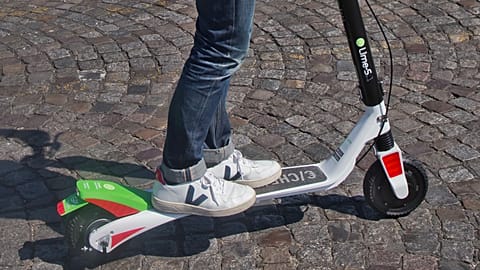One in four workplaces in Europe is making decisions using algorithms or AI that will impact the working life of their employees. Unions say they’re struggling to negotiate worker rights.
As artificial intelligence (AI) and algorithmic management tools trickle into Europe’s workplaces, labour professionals are urging the European Union to introduce a new directive to safeguard workers’ rights.
A quarter of Europe’s workplaces are using algorithms or AI to automate work decisions traditionally carried out by managers, according to a study conducted by Lithuanian research agency Visionary Analytics for the European Commission. This figure is expected to “grow rapidly in the next 10 years,” the report warns.
The report said the tools are used in recruitment, work task scheduling, directing workers on how to complete their tasks, surveillance, and worker evaluations, largely for those working with big platforms like Uber or Lyft.
It’s now trickling down to more traditional jobs. A joint report from the Commission and the International Labour Organisation (ILO) found that the French logistics sector uses AI-powered route planning tools to give drivers information like road traffic and delivery locations in real time, but this can lead to “extensive monitoring and surveillance of drivers”.
The European Trade Union Confederation (ETUC) said its members are struggling to negotiate collective agreements that ensure workers know about the algorithms in their workplaces and how they affect them.
“It’s a new topic, it’s a challenging topic, and many of the trade unions do not actually have the expertise or the capacities to address it,” Tea Jarc, confederal secretary of the ETUC, told Euronews Next.
Algorithms to become more ‘pervasive’ at work
Algorithmic management can decide an employee’s working conditions, such as the hours that people work, wages, shifts, and performance assessment.
Jarc said there are cases where the algorithms are also collecting data that they shouldn’t, such as mental health data. She also said that the platforms are tracking employees even when they log off.
In many cases, these workplaces are introducing new algorithms or metrics to measure employee performance “without informing trade unions” or the workers, she added.
The Commission said in its report that existing EU legislation focuses on some workplace issues affected by algorithmic management, such as work intensity, transparency and predictability, but that some gaps still remain, like distinguishing between work and rest time.
“It’s time that those companies understand that they cannot hide [management decisions] behind the algorithms,” Jarc said.
Alessio Bertolini, researcher at the Oxford Internet Institute in the United Kingdom, said that algorithmic management has been around in some capacity since the 1990s, but it's having a resurgence with the recent AI wave at work.
“What we’re going to see more in the next few years is only a more sophisticated version [of algorithms] that [are] definitely more pervasive in the workplace,” Bertolini said.
Unions don’t have financial means to hire algorithm experts
Figures from Uni Europa, a union representing more than 7 million workers in the European Union, say there are 23 agreements signed throughout Europe with some mention of algorithmic management.
The unions that successfully negotiated these agreements include Spain’s Workers’ Commission (CCOO) and General Union of Workers (UGT), and Denmark’s United Federation of Workers (3F). They have called for external experts to help them draft them and have the right budget to be able to do that, Jarc said.
Most of the unions across the European Union don’t have the same resources as larger national unions, Jarc said.
“What we fear is that many of the other unions, of course, do not have the financial means to do that,” she said, noting that experts should be shared across borders to help unions with fewer resources put agreements in place.
Even for those workers covered by a collective agreement, Jarc said the enforcement is “very low” and often depends on whether employees are going to their management and asking for more information about how they might be surveilled at work.
Jarc said any updated legislation on algorithmic management needs to give “more collective rights” to trade unions so they can step into these disputes and enforce the collective agreements that are signed.
‘Legislators are lagging behind’
So far in Europe, the legislation that addresses algorithmic management is “very limited” to those working in the gig economy for popular platforms such as Uber or Amazon, Jarc and Bertolini said.
In 2024, the European Union passed the Platform Workers Directive that says that workers “cannot be fired or dismissed based on a decision taken by an algorithm or an automated decision-making system”.
Legislation passed by member states under the directive will also guarantee employees the right to human oversight of any decisions that are made by an algorithm. It also forces companies to disclose if and when they’ve made changes to their algorithms.
Jarc and Bertolini said that while the directive is a great first step for those working for Big Tech platforms, it’s already a bit “dated” since it only addresses gig workers.
Both said they want to see either a new EU Commission directive or amendments to the Platform Workers Directive that would guarantee that workers in the EU will be able to review any algorithmic decisions made by their management.
“We as legislators, we are lagging behind,” Jarc said. “Technology is already taking over … it’s already a reality of the millions and millions of workers across Europe, but it’s not being regulated”.
Ideally, the ETUC wants to see this take shape as a separate directive on AI in the workplace that would be launched around the same time as the EU Commission’s Quality Job Roadmap initiative before the end of the year.
This was one of the recommendations put forward to the EU Commission from Andrzej Bula, the rapporteur of the committee of employment and social affairs, earlier this year.
There are also some provisions in Europe’s General Data Protection Rules (GDPR) and the EU AI Act that protect Europeans, such as being able to request the data that tech companies have on you and where it is stored.


















